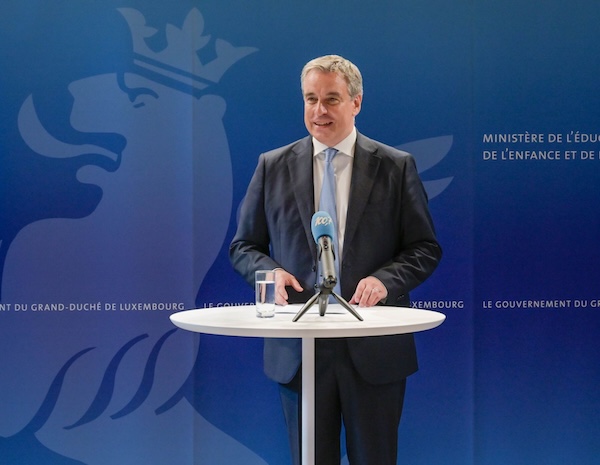 Claude Meisch, Luxembourg’s Minister of National Education, Children and Youth;
Credit: MENEJ
Claude Meisch, Luxembourg’s Minister of National Education, Children and Youth;
Credit: MENEJ
On Thursday 11 September 2025, Luxembourg’s Minister of National Education, Children and Youth, Claude Meisch, presented the key priorities for the 2025/2026 school year.
According to the Ministry, today’s society is facing challenges such as inequality, linguistic diversity and the risks and opportunities of digitalisation, making it necessary to reinforce social cohesion. The education system is regarded as a central instrument to unite people, build bridges and turn diversity into a strength.
“Our country is facing major challenges: inequalities, strong linguistic diversity, and new technologies that bring both opportunities and risks. This is why we must strengthen the unity of our society and move forward together. The education system is the key: it brings people together, builds bridges and turns diversity into a strength,” said Minister Meisch at the press conference.
Language and Literacy Choices
The Ministry underlined that “pupils who learn to read and write in a language close to their mother tongue have better chances of succeeding in their school careers.” With the project ALPHA - zesumme wuessen, parents will, for the first time in the third term of the 2026/2027 school year, be able to choose between literacy in German or French for their child in cycle 1.2. Teachers in cycle 1 will be intensively prepared for this approach during 2025/2026.
At the same time, “a more flexible offer of teaching languages continues to be introduced in secondary schools.” Three new schools are offering French-speaking classes in year seven of general secondary education. The international baccalaureate offer is also being expanded, as is access to vocational training in French and English. Two new sites of the École internationale Gaston Thorn, in Walferdange and Kirchberg, as well as the planned creation of a new public European school in Schifflange, respond to the strong demand for greater flexibility in teaching languages.
Digitalisation and Artificial Intelligence
The Ministry noted that “digitalisation and artificial intelligence (AI) are already shaping the lives of children and young people.” For a healthy balance between the digital world and real life (Screen-Life-Balance), the WibS programme is being implemented in primary education. In secondary schools, an additional physical education lesson is being introduced for year six classes. Two sports and movement activities are offered each day by childcare centres, and secondary schools are receiving additional resources to adapt their premises to encourage movement and interaction. Both primary and secondary schools also benefit from an expanded cultural offer from this rentrée.
After regulating smartphone use, the Ministry is launching a national strategy for the use of AI in schools in 2025/2026. It emphasised that “for responsible use, it is essential to strengthen human skills from primary education onwards, before pupils in the lower years of secondary school learn how AI works as part of the Digital Sciences course.” In upper years, AI will then be used in a targeted way to support learning. With the KI-Kompass platform, the Ministry provides schools with a selection of AI tools for safe use. The main lines of this strategy will be discussed with stakeholders in the coming weeks.
Inclusive Education
For pupils with specific needs to be able to grow together at school, the Ministry stated that “continued investment in inclusion is necessary.” In 2025/2026, the network of competence centres will continue to be regionalised and brought closer to schools. Primary schools will benefit from additional resources: the new ONE-Schouldéngscht service, additional assistants for pupils with specific educational needs (A-EBS) and specialised teachers (I-EBS), as well as two new socio-therapeutic centres (CST), will serve as key contacts for local support.
Vocational Training and New Programmes
The Ministry stressed that “craftsmanship is a pillar of society and the economy. Even in the age of AI, strong vocational training remains essential.” Investments continue in modern initial training, continuing education opportunities and new perspectives such as a Première-DAP or advanced vocational training. In this context, the Ministry underlined the importance of enabling young people to discover their talents and trades at an early stage, whether through school options or extracurricular activities.
It added that “education strengthens cohesion if society invests in it and develops it collectively.” In primary education, the finalisation of the new curriculum is continuing, while in secondary education a broad consultation on programmes will be launched. New courses are starting in 2025/2026, including Music Production at Lycée Michel Lucius and Economics and Data Literacy at the École de commerce et de gestion. Following the International School in Mondorf-les-Bains, the Schengen-Lycée is also launching an innovative open-learning concept. In its new annex in Wickrange, the École d’hôtellerie et de tourisme du Luxembourg will offer 50 pupils from the capital and the south training closer to home.
The Ministry confirmed that several political priorities will also be pursued, including the reform of the preparatory track in general secondary education, the reform of the lower years of general secondary education, as well as the reform of the childcare voucher system and the development of quality and innovation in non-formal education.








